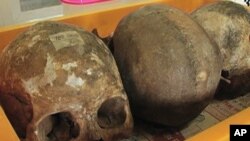The world is commemorating the 60th anniversary of the start of the Korean War. One of the darkest aspects of that war is the number of civilians killed, and a special commission formed to shed light on the killings is due to wrap up its work soon. It may accomplish little in reconciling South Korea's deep divisions about the past.
Ma Im-soon is in her sixties now, but she comes back often to this abandoned mine, where she says something very bad happened when she was a little girl.
She says police and right-wing thugs dragged men from the town here right after Seoul was recaptured from the North Korean army in September 1950. They were tied up two by two and walked up the hill without their shoes. Then, she says, they were shot and pushed into the pit. Ma says 153 skeletons were dug up later.
Ma's story is not an isolated account - tens of thousands of other Koreans are believed to have been summarily executed during the war in the early 1950s.
South Korean investigators have been exhuming mass graves and taking testimony as part of a Truth and Reconciliation Commission formed in 2005. Its work is now drawing to a close, after lawmakers chose not to extend its mandate.
Kim Dong-choon served on the commission. He says South Korea's divisive politics kept the commission from fulfilling its true potential.
Kim says from the moment he was appointed, there were conservative media attacks and lawsuits. Conservatives attacked us ideologically, slandering our work as a leftist offensive on the right.
South Korean military forces and police are believed to have committed most of the killings, executing those they suspected of collaborating with Communist forces.
The Commission has investigated more than 8,000 cases that were submitted in the form of citizen petitions. But some say the killings number more than 100,000. They also say there is a need to investigate the degree of possible U.S. involvement in civilian massacres.
Lee Young-jo is the current president of the commission. He says the commission can be proud of the work it has done. He says it is a sad reality that most South Koreans are much more focused on their modern lives than on the wrongs of the past.
"Average South Koreans are not very much interested in our investigation," said Lee. "As far as I know, many South Koreans believe that it is just a waste of resources. They are asking, 'What is the point of going back 60 years, and digging into the dusty documents?'"
Back at the abandoned mine, Ma In-Soom says all Koreans have a duty to remember.
She says it is no wonder the young people grew apathetic toward this issue, since all they see is the older generation fighting each other. Yes, the young generation is quite indifferent about this, she says, and it may even be a bit understandable, but it is still wrong.




